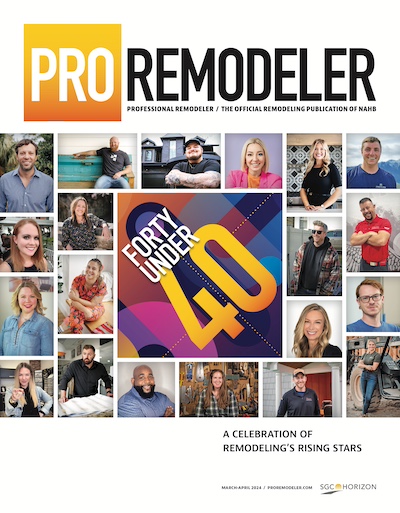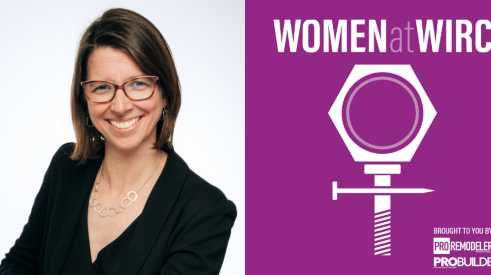Repeat and referral business is the lifeblood of many remodeling companies. These prospects are the most predisposed to understand and like your firm, and the sales are often easier to close. Even so, these leads have to be screened just like any other. And sometimes they're even worth turning down. Jud Motsenbocker asks remodelers Kevin Franklin and Dave Tibbetts how to balance sales and sensibility.
Jud: Have you ever turned down repeat business?
Kevin: We certainly have turned down repeat business. In a lot of cases it's been because we've transitioned into other things. Somebody calls from four or five years past, we did something small for them and they're looking for us to do something small again, and we're out of that business now. Those are easy calls to make.
The harder ones are good clients you've done a $100,000 or $200,000 room addition for and they need something small that's not really what we prefer to do or are set up to do. By and large we continue to do those just to stay with those folks. The ones that we've turned down have been if we did not have a great relationship with the folks in the first go around, if we feel we were taken advantage of, if we feel that they didn't appreciate the value we brought to the table, if there were communication issues.
Sometimes in the early years we did things based more on price and less on value. Now we're more about value, and so some of those folks that call us occasionally are still caught up in that price mode.
Dave: There is one customer who rings a bell. This is back in the days before getting signed change orders. It gets to the end of the job, and we've done all these things way over and above, and the guy stiffed me. Tells me we've got an agreement for x number of dollars and that's what I'm going to get. Then he calls back in two years. I couldn't even believe this guy was talking to me. I simply told him that I felt his memory of our experience was better than mine.
It seems like when you put your boundaries down and make a declaration of how it's going to be, somehow unforeseen forces bring you what you want. If you're willing to take crap that comes down the pike, then you're busy doing that.
Jud: You've put in some different systems ¡ª you're getting signed contracts and/or change orders ¡ª after guys like that taught you those lessons.
Kevin: Early on I met a guy who had been in the construction business for years. He said, "You're working on a handshake?" I said, "Yeah." And he said, "Man you just haven't been screwed good enough yet, that's all." He was right, you know.
I've had other customers who were terrific long-term customers years ago when we did anything involving a house. I had one where we were her personal carpenters. I can't provide that service anymore. We simply told her that we're just not who we used to be; we're not the same company. She understood that.
Jud: Let's talk about a referral customer. Now we're not dealing with a single person, we're dealing with two people.
Dave: When I'm out selling I'm very much on the lookout for someone with whom I don't think we have a good relationship. My feeling is that if it's not good at that point, it certainly is not going to get better when I start working for them. Everyone that I've ever had a bad experience with, I've always felt like the handwriting is on the wall ¡ª I just didn't read it. There's all kind of red bells going off and red lights where you just felt like you couldn't please this person. That would be one circumstance when I would decline an opportunity to work.
It's generally a pretty awkward thing to do. We've had certain people whom we've gotten kind of far down the road with in the sales process, but through the interactions that I had up to that point, you just think this is not going to be a good thing. To break up with somebody at that point is kind of awkward.
Jud: In that case, do you go back and send a letter to the referral and tell them that the program just didn't work out? Or do you let it go at that point?
Dave: I let it go. There have probably been four of them in the last eight years, and two of them really weren't pretty. I've learned a lesson on how not to do it by the way it went down. The lady really didn't understand why I would pull the plug on it. I think in the future that I would just handle it in a very straight up manner and say, "I just didn't feel that we were going to work well together."
Jud: Kevin, what do you do with referral business that you have to turn down?
Kevin: You might have a client that you consider a really good client and you did a big room addition for and they've referred you to somebody who is calling for a bathroom remodel or basement finish, something a step down from what we do. At first you don't want to risk letting the original referral down, and we've tried to handle those.
What we've learned over the years is that if it's not a good fit for you, it's better to say that up front before you get involved. Then I try to take that opportunity to drop the person who made the referral a little note to thank them, and explain the position that we've taken and let them know why we're not doing it. This referral is too far out of our geographical region; we can't properly manage the project; we don't feel we can meet the client's expectations. I've never had to say, "I really don't think I can get along with this person." I wouldn't do that.
I try to use it as an education opportunity with the person who made the referral as well as the person that is calling about the project. I say, "This is not really what we do," and I explain to both of them what it is that we do. I've had several prospects that I never did a job for but who referred me to two or three other people, because they understood what we do and appreciate that I'm up front with them and not wasting their time in going out.
Most of the stuff we turn down doesn't even get to that point. It's because it's outside of a specific geographic area that we target or it's a smaller scope than we do at this point. It becomes harder if you find yourself a little bit low on work. We try to resist doing that. We don't have a lot of guys out in the field and we subcontract a lot, so that's made it easy to not chase after jobs just to keep the guys busy. That's a mistake.
Jud: What clues let you know to walk away from repeat or referral business up front?
Kevin: I think a lot of it is the past experience, the past relationship you've had. If it's always a person who wants to give you limited information and then they're kind of whittling away at you and always trying to get something more than what they're paying for, that's definitely a red flag for me. If they're trying to dictate the terms of business and they're different from our process. If they say, I've got somebody who can furnish the plumbing fixtures, or I just need you to do the shell, or I've got a set of plans already. When they try to get me out of my process I might let one thing go, but if I hear two or three things that are outside my process...
Jud: When you feel like you're losing control, you say, "Time out."
Kevin: That's right. That's it. If they can never meet me during normal business hours. I've got to be after hours, or they're pushing for weekends, or they call and cancel meetings a lot. If it's hard in the first part, in the design phase, in the set up, it's not going to get any better when you get to production. Then all I'm doing is handing my production manager a problem, which becomes my problem.
Dave: The red flags to me are a guy that's looking at work and telling me how bad it is, when it looks like work that we would do. Somebody who tells you that he's a very picky person, very hard person to please. Not that we can't deliver good work, but what are his expectations? Other things would be when people tell me how easy this is going to be. "Oh, this is easy man, you can just whip this in here and whip this in there."
Kevin: "I'd do it myself, but I don't have time."
Dave: Right.
Jud: "Do you charge for estimates?"
Dave: Not "Do you charge?" but "Are they free?" They just told you everything you probably need to hear about where you're going in that relationship.
Jud: Is there any profession that either one of you has refused to work with? Is that a red flag in any way?
Dave: Yeah, doctors, attorneys and engineers. I know that's a big generalization, but those are the people I've had more problems with than any other profession. I wouldn't not go on a call or refuse to work for them.
Kevin: I try not to generalize folks like that. The ones that can most afford to pay seem to be the ones we deal with for the most part.
Jud: If we get a phone call and the area code is 285, which is Ball State University, we are cautious. That's a yellow flag that this may be somebody that is a little more difficult to work with, and we may or may not want to go there.
Kevin: We have a three-strike rule. If somebody is outside of our geographical area, that's one strike. If it's a job that's not really the type of job that we do, that's two strikes. If there's something about their demeanor or whatever, that's three strikes, and it's over. We're very cautious even at two, but sometimes I'll go, especially if it's a referral.
Jud: How do you get out of this gracefully? Is there anything in particular that you say?
Kevin: I had one client that was really kind of difficult. I really had gone down the road with them on the design, and we'd done four or five iterations, and then I was starting to get up against a time deadline.
To make it worse it was a neighbor and a person in our parish, and I knew that word was going to get around. You don't know how many people that one person touches, and you don't want to get a misunderstanding or bad reputation. I ended up telling him I was having trouble coming up against the time and against their budget. I was concerned that once we got in the project they were going to change their minds, but I didn't dwell on that piece. I just told them that I didn't think we could meet their expectations and that I just felt it was better that we stop before we got started.
Dave: The shortest and sweetest way that I could say it would be, "I don't feel we're going to be a good fit for each other." I would start with that, just because it's generalized. You could allude to the work not being the exact nature of what you're doing.
Jud: Have you ever fired a repeat or referral customer? Has there ever been a case where you just flat out walked?
Dave: Usually it's with the guy who beat you up the first time. We did work for a builder who builds million-dollar homes. This guy's out to just whittle and shave and figure a way to beat you out of whatever he can. We delivered first-class stuff. The deck was dead on where it should have been. The shingles were put on incorrectly. He held back $400, and then wanted another deck sometime down the road. Similar to the other guy who called me back after he told me that he wasn't paying for any changes. We absolutely told them no.
Kevin: We have two phases of design that we charge for and then the construction phase. There have been times where I've fired folks within that first phase. That's kind of what happened to this one I just mentioned. They already paid me for some design work, and I completed that design work before I said I don't think we can meet your expectations. I didn't like to walk away from a commitment midstream.
I've had others where we got halfway into the process and it stalled out because they couldn't make a decision or other things change in their life and then they lose interest. If I haven't completed what I've set out to do in those cases, I basically cancel the deal and refund a portion of their money for whatever I haven't, in my mind, done. If I've charged them a thousand dollars for design and I've only done a few sketches, and we haven't completed them and done elevations, then I'll say we ought to stop here and give you back your money.
Jud: Dave, got anything to add to that?
Dave: We really put ourselves out there with regard to the design in hopes that we get the opportunity to build it. We've toyed with charging for a design, but that doesn't seem to be the way it works around here. So I've had hours and hours into some things, and you're in that sixth revision with phone calls and meetings...you just get a feeling that this isn't going to get better, only worse. So you just walk.
Jud: You just fire the customer.
Dave: We recently had a guy who I didn't meet, but one of the women in the office who sells said, "The guy's 5¡ä 2¡å, and he's got short man's syndrome." I didn't know about that, but the guy was abusive to people on the phone here, so I told her, just fire him. He couldn't believe it. He was blown away. I called him because he challenged me to and asked if I had enough guts to call him, and I did. His tone and demeanor with me were very pleasant until I was solid on our position, and then I saw the side that they saw.
Jud: Would we all agree that when one of the people in your office has a difficult time with a client, you may want to look into it further? When they talk to us as owners, they're real nice, but when they talk to the receptionist, they're real nasty ¡ª that would certainly be a caution flag, wouldn't it?
Dave: Oh yeah.
Jud: We've all got to be on the same page with the company.
Dave: I'd have lost face with my own people if I had changed my position.
Jud: How do you fire the client? What do you say?
Kevin: I don't want to turn it into a personal attack or turn it into personalities. I make it more about the process or location or that you're asking me to use resources and products that I'm not familiar or comfortable with. I'll turn it back into my problem.
Dave: Same thing. We're not a fit, and we're too far apart. I don't feel that we're going to be able to work well together. It's certainly different if they're relatives of all of your other clients. You've really got to be careful in a situation like that.
Jud: Do either one of you take this referral or past customer and refer them to another contractor?
Dave: That's the best way to get out of where you are, I've found. Whether or not they'd actually ever call is another story. This guy that I just fired, I offered to refer him and he hung up on me.
Kevin: We've sent them to our local HBA, and they provide a published list of phone numbers. If it's somebody that we've had problems with, I sure as heck don't want to send them to somebody else. What goes around, comes around.
Dave: Yeah, there was a situation where my relationship with the client changed, and I called the guy that I had referred and warned him to be on the lookout. Just as a courtesy.
Jud: Do you have a client referral program?
Kevin: If a referral does become a job, we give the person that referred a gift of some sort. It might be as simple as some flowers or a restaurant gift certificate. We tailor it to the client.
Dave: When we're done with a job we send out an invitation for referrals and offer to pay cash for them. I think it's $50. We only pay for the referrals that go with us.
I've been beat up by that early on in my career. You get the guy who says he'll do the fence, but he has three neighbors who are all going to do fences too, so he wants a better price. I fell for it. I did his fence, and I went to the neighbors and they didn't know what I was talking about. I just totally caught a lesson on that one.
|
When to turn down repeat or referral business
Add new comment
Related Stories
How to Create a World-Class Remodeling Team
Great remodeling companies position themselves for the future with the right players
Everyone Should Have a Number: KPIs for Your Design Build Team
Measuring key performance indicators guides your team to success while creating accountability and ownership
How to Revamp Your Pre-Construction Process
Experiencing too much slippage and delays? See how Bridget Bacon of Red House Design Build solved these issues by improving the remodeler's pre-construction process
How This Remodeler Revamped Their Pre-Construction Process
Bridget Bacon of Red House Design Build outlines how she helped transform the pre-construction process for improved finances and morale
Building A Small Projects Division from the Ground Up
Through hard work and careful strategy, Harth Home Services has seen big growth
A Mindset of Serving Others
A research study shows surprising results about what makes us take ownership of our work.
3 Keys to Successful Team Management
On this episode of Women at WIRC, hear Laura Burnes delve into her approach to leadership and project management, in addition to sharing insights into Adams + Beasley Associates' winning culture.
4 Steps to Prep Your Business for Contraction
How a remodeling company plans ahead for the worst of times (and the best of times)
Helping Remodelers 'Get Their House In Order'
From remodeler to NARI executive to industry consultant, Diane Welhouse uses her expertise to help business owners












